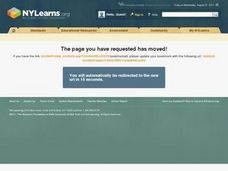Curated OER
Displacement of Water
To calculate the volume of a stopper by using the method of water displacement., students work with a web animation. They observe the method and then click a button to gather information about the calculations for the stopper dropped in...
Curated OER
Soil Runoff Challenge
Learners find ways to decrease soil runoff for an African Village as a part of a Peace Corps project. In this soil runoff lesson, students play a soil runoff challenge online. Learners complete online activities and view a slide show to...
Curated OER
Coral Polyp Party
Students complete a project where they label the parts of a coral polyp and discuss the differences between plants and animals. Students use marshmallows, sprinkles, toothpicks, and more to label their coral polyp.
Curated OER
Waves: the Nature of Waves
Each of the slides has some information or a few definitions about the travel of energy through different media. There are references given to obtain further information, which makes this slideshow a great tool for introduction or as a...
Curated OER
Electricity
A start to instruction about electricity, important terminology is defined and this is a great way to display the basic information. This would be useful if you are practicing a notetaking process or starting a project that the students...
Curated OER
Atomic Structure
A flashy PowerPoint includes clear summaries of atomic structure and electronic configuration. Dot and cross diagrams will help viewers learn how to draw an atom. As a result, learners should be more clear how electronic configuration...
Curated OER
The Periodic Table
These slides introduce the basics of the Periodic Table structure and the history and reasoning behind its organization. A useful chart on the fifth page gives the main properties and differences between metals, non-metals and...
Curated OER
Polyatomic Ions
Opening with a chart of common polyatomic ions, and finishing with an explanation of how to name polyatomic ions, this presentation is to the point. The links on the vocabulary page do not work, leaving you only a few slides to work...
Curated OER
Fish Tales
Have your class learn about marine life. Learners write a story about a fish, create an art project, and share their work with the class. This experience could be enhanced by having them conduct Internet research to discover some of the...
US Fish and Wildlife Service
Endangered Species
This handout goes along with the slide show linked at the top of the of the resource. Depending on the computer availability in your school, this could be a WebQuest in which learners go through the slide show at their own pace, or you...
Virginia Department of Education
Researching Information on the Internet
Practice Internet research skills. Each class member will need Internet access in order to follow along as you model how to search using key words and to do their own research on African and Asian elephants. Their notes will go into a...
California Academy of Science
Energy: A Day in My Life
If only we could harness the energy of fifth graders, our energy problems would be over! The class discusses where different forms of energy come from and how we use them. They complete a chart of the activities that they do daily that...
Curated OER
Vegetable Flowers with Homemade Ranch Dip
Vegetables aren't just things we can grow to eat; now they are things we can grow to create art! Use this cute and kid-friendly recipe during your next Earth Day celebration. It includes step-by-step instructions on how to turn...
Intel
Designer Genes: One Size Fits All?
In this STEM group of 10 activities, lesson two focuses on the question, "Just because we can, should we?" when considering genetically engineered food. Classes hear a scenario and, as young scientists and geneticists, must determine if...
Curated OER
Final Project: Food and Nutrition Class
Students plan appropriate diets for themselves and others using the USDA Dietary Guidelines. They indicate their average cost of food at home on a thrifty plan and prepare a one-week menu plan including breakfast, lunch, dinner, and a...
UAF Geophysical Institute
Observing the Weather
How can you predict the weather without any technology? Young scientists learn to forecast the weather using traditional Native American techniques. Based on their observations of the weather, as well as talking to their classmates, they...
Prince William Network
Migration Headache
During this game, kids become migratory shorebirds and fly among wintering, nesting, and stopover habitats. If they do not arrive at a suitable habitat on time, they do not survive. Catastrophic events are periodically introduced that...
Education Outside
Papermaking
Imagine recycling food scraps and using them to make paper. The directions are all here in a seven-page packet that details several paper-making strategies.
Foundation for Water & Energy Education
How Can Work Be Done with Water Power? Activity B
In this second of three activities, energy engineers plan and create a hydropower dam as they learn how hydroelectric power plants generate electricity. A hydropower puzzle is also included, which can be worked on by teams that finish...
University of Colorado
Are All Asteroids' Surfaces the Same Age?
There are more than 600,000 asteroids in our solar system. Pupils analyze images of two asteroids in order to determine if they are the same age. They count craters for each asteroid and compare numbers.
Polar Trec
Drawing Diatoms like Ernst Haeckel
Why do scientists rely on drawings rather than just photographs of their research studies? The lesson plan introduces drawings of microscopic organisms and the importance of accuracy. Young artists draw organisms and learn why focus and...
University of Florida
The Magic School Bus and the Electric Field Trip
Energize a shared reading of the Magic School Bus and the Electric Field Trip with this collection of supplemental materials. Whether your looking for discussion questions, reading comprehension worksheets, or writing prompts, this...
Curated OER
How Gear Systems Work: A Research Project
Students apply information regarding simple machines along with the math concept "ratios." The teacher introduces the concept that technology is the application of scientific knowledge and mathematics concepts to solve a problem. This is...
Space Science Institute
The "All American" Eclipse Guide
Are you ready for the biggest astronomical event of the year? More importantly ... are you ready to share it with your scholars? Use a presentation filled with facts and diagrams to make sure everyone in class understands the importance...
Other popular searches
- 4th Grade Science Project
- Physical Science Projects
- Science Project on Pulleys
- Science Project Volcano
- Science Project Gravity
- Science Project Ideas
- Forensic Science Project
- Science Fair Project Ideas
- Rock Science Project
- Science Project Food
- Science Project Terrarium
- Science Fair Project Data

























